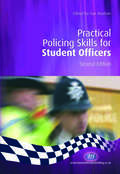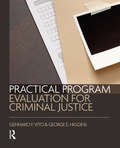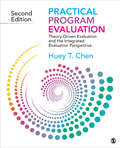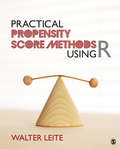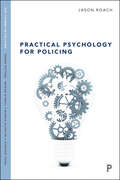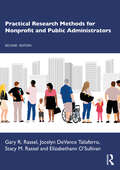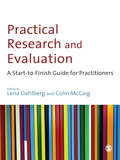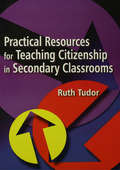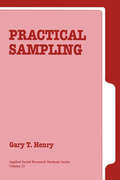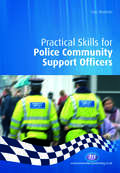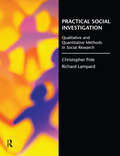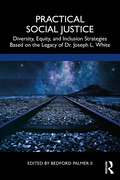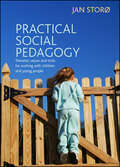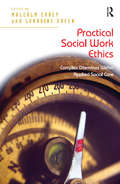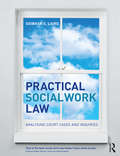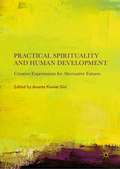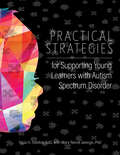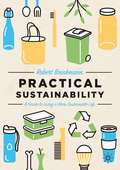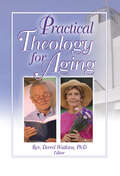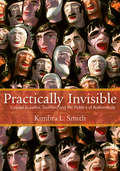- Table View
- List View
Practical Policing Skills for Student Officers (Practical Policing Skills Series)
by Sue Madsen, David Crow, Amanda Form, Gary Fraser, Trefor Giles and Gary WynnThe Initial Police Learning and Development Programme (IPLDP) is structured around National Occupational Standards (NOS), against which new officers will be trained and assessed. This book, written by police officers, introduces student officers to the key competency areas and elementary skills required. It introduces the key policing skills and guides the reader through typical scenarios, addressing issues in the context of modern policing, and of the relevant professional competencies and occupational standards. This latest edition has been expanded with chapters on the core policing skills, and includes references to the NOS.
Practical Program Evaluation for Criminal Justice
by George E. Higgins Gennaro F. VitoPractical Program Evaluation for Criminal Justice shows readers how to apply the principles of fiscal responsibility, accountability, and evidence-based practice to criminal justice reform plans. Unlike other policy-based texts, which tend to focus more on implementation than assessment, this book provides applicable, step-by-step instruction on determining an initiative's necessity prior to its adoption (reducing the risk of wasting resources), as well as how to accurately gauge its effectiveness during initial roll-out stages. The book gradually introduces basic data analysis procedures and statistical techniques, which, once mastered, can be used to prove or disprove a program's worth. Lastly, the book introduces the types of stakeholders who should review evaluation results for quick action, as well as how to best structure reports to ensure their buy-in.
Practical Program Evaluation: Theory-Driven Evaluation and the Integrated Evaluation Perspective
by Huey T. ChenThe Second Edition of Practical Program Evaluation shows readers how to systematically identify stakeholders’ needs in order to select the evaluation options best suited to meet those needs. Within his discussion of the various evaluation types, Huey T. Chen details a range of evaluation approaches suitable for use across a program’s life cycle. At the core of program evaluation is its body of concepts, theories, and methods. This revised edition provides an overview of these, and includes expanded coverage of both introductory and more cutting-edge techniques within six new chapters. Illustrated throughout with real-world examples that bring the material to life, the Second Edition provides many new tools to enrich the evaluator’s toolbox. “In this eminently readable book, Chen presents a strong matrix framework for conceptualizing a full range of evaluation strategies and approaches… The writing is exceptionally clear, accessible to novice evaluators, and, because it is fair-minded and principled, of relevance to seasoned evaluators as well.” —Jennifer Greene, University of Illinois at Urbana-Champaign "Professor Chen's Second Edition of Practical Program Evaluation sets a new standard for providing a variety of systematic frameworks for conducting high quality program evaluations. The readers will come away with a detailed understanding of both conventional and cutting-edge approaches. It is a must-read for practicing program evaluators, evaluation scholars, and students of evaluation." —Stewart I. Donaldson, Claremont Graduate University "Chen brings decades of evaluation and experience to this new edition. He continues his innovative and pragmatic thinking about evaluation, including identifying, constructing, and testing theories that can work in practice. Dr. Chen shows how to blend formative and summative evaluation, process and outcome evaluation, theory and action, and much more.” —R. Burke Johnson, University of South Alabama “Dr. Chen’s latest effort offers evaluators a thoughtful expansion on the topics addressed in Practical Program Evaluation (2005) in terms of program theory, logic modeling, and his evaluation typology. New chapters gleaned from the field reveal solution sets for overcoming challenges in a variety of contexts while still balancing scientific and stakeholder needs. This new work provides a solid foundation for the further development of an evaluator’s acumen.” —Gregg M. Gascon, Ohio State University “Chen has the best conceptual framework, and the quality of his writing and analysis are superb. He takes the reader through the essential steps in evaluation, with particularly valuable treatment of stakeholder involvement.” —Mario A. Rivera, University of New Mexico
Practical Program Evaluation: Theory-Driven Evaluation and the Integrated Evaluation Perspective
by Huey T. ChenThe Second Edition of Practical Program Evaluation shows readers how to systematically identify stakeholders’ needs in order to select the evaluation options best suited to meet those needs. Within his discussion of the various evaluation types, Huey T. Chen details a range of evaluation approaches suitable for use across a program’s life cycle. At the core of program evaluation is its body of concepts, theories, and methods. This revised edition provides an overview of these, and includes expanded coverage of both introductory and more cutting-edge techniques within six new chapters. Illustrated throughout with real-world examples that bring the material to life, the Second Edition provides many new tools to enrich the evaluator’s toolbox. “In this eminently readable book, Chen presents a strong matrix framework for conceptualizing a full range of evaluation strategies and approaches… The writing is exceptionally clear, accessible to novice evaluators, and, because it is fair-minded and principled, of relevance to seasoned evaluators as well.” —Jennifer Greene, University of Illinois at Urbana-Champaign "Professor Chen's Second Edition of Practical Program Evaluation sets a new standard for providing a variety of systematic frameworks for conducting high quality program evaluations. The readers will come away with a detailed understanding of both conventional and cutting-edge approaches. It is a must-read for practicing program evaluators, evaluation scholars, and students of evaluation." —Stewart I. Donaldson, Claremont Graduate University "Chen brings decades of evaluation and experience to this new edition. He continues his innovative and pragmatic thinking about evaluation, including identifying, constructing, and testing theories that can work in practice. Dr. Chen shows how to blend formative and summative evaluation, process and outcome evaluation, theory and action, and much more.” —R. Burke Johnson, University of South Alabama “Dr. Chen’s latest effort offers evaluators a thoughtful expansion on the topics addressed in Practical Program Evaluation (2005) in terms of program theory, logic modeling, and his evaluation typology. New chapters gleaned from the field reveal solution sets for overcoming challenges in a variety of contexts while still balancing scientific and stakeholder needs. This new work provides a solid foundation for the further development of an evaluator’s acumen.” —Gregg M. Gascon, Ohio State University “Chen has the best conceptual framework, and the quality of his writing and analysis are superb. He takes the reader through the essential steps in evaluation, with particularly valuable treatment of stakeholder involvement.” —Mario A. Rivera, University of New Mexico
Practical Propensity Score Methods Using R
by Walter L. LeiteThis practical book uses a step-by-step analysis of realistic examples to help students understand the theory and code for implementing propensity score analysis with the R statistical language. With a comparison of both well-established and cutting-edge propensity score methods, the text highlights where solid guidelines exist to support best practices and where there is scarcity of research. Readers will find that this scaffolded approach to R and the book’s free online resources help them apply the text’s concepts to the analysis of their own data.
Practical Propensity Score Methods Using R
by Walter L. LeiteThis practical book uses a step-by-step analysis of realistic examples to help students understand the theory and code for implementing propensity score analysis with the R statistical language. With a comparison of both well-established and cutting-edge propensity score methods, the text highlights where solid guidelines exist to support best practices and where there is scarcity of research. Readers will find that this scaffolded approach to R and the book’s free online resources help them apply the text’s concepts to the analysis of their own data.
Practical Psychology for Policing (Key Themes in Policing)
by Jason RoachAs contemporary policing becomes ever more complex, so knowledge of practical psychology becomes ever more important in everyday policing encounters, situations and contexts. This book suggests how new ways of applying psychological knowledge and research can be of benefit in a range of policing contexts, for example, beat patrols, preventing crime and using the self-selection policing approach to uncover serious criminality from less serious offences. Looking forward, Jason Roach suggests how psychological knowledge, research and policing might evolve together, to meet the changing challenges faced by contemporary policing. In encouraging critical thinking and practical application, this book is essential reading for both police practitioners and criminology, policing and psychology students.
Practical Research Methods for Nonprofit and Public Administrators
by Gary R. Rassel Elizabethann O'Sullivan Jocelyn DeVance Taliaferro Stacy M. RasselPractical Research Methods for Nonprofit and Public Administrators, Second Edition, covers basic principles of research design, data collection, data analysis, reporting and ethical principles of research. The discussion describes the skills as they would be used in practice in a not-for-profit or public administration environment. The book gives pragmatic instructions for designing research to ensure that results will be accurate and administrators can have confidence in them. It covers techniques to assure that researchers are measuring what they intend to measure and in a way that will be useful and manageable. Sampling methods to find out about larger populations are discussed as are survey, interview, and focus group data collection procedures. The book describes how Geographic Information Systems (GIS) are used to obtain information on the locations of service needs and providers and to draw maps showing these. Participatory research methods including community needs assessments and asset mapping are discussed. The book includes chapters on statistical analysis, visual displays of data, reporting of results and evaluation of programs. The use of computer programs for analyzing data is detailed and illustrated by examples. The appropriate software for analysis and mapping is discussed. A chapter updates the ethics and government requirements for research. Each chapter includes examples and exercises to enhance learning. The book is intended for administrators in not-for-profit and public administration organizations, providing practical skills that can be used in many situations. It is also intended for use as a text in academic programs in administration and management.
Practical Research Methods for Nonprofit and Public Administrators, Instructor's Manual (Download only)
by Elizabethann O'SullivanOrganized around the four types of studies typically conducted by effective managers and programs, Practical Research Methods for Nonprofit and Public Administrators integrates traditional research methods topics with specific management applications. This unique text includes extensive end-of-chapter exercises highlighting the importance of qualitative methods and emphasizing practical skills managers should be able to easily and correctly apply.
Practical Research and Evaluation: A Start-to-Finish Guide for Practitioners
by Lena Dahlberg Dr Colin MccaigThis book is a starter 'DIY' text for practitioners who are looking to conduct evaluation studies and research as part of their own professional practice. The growing emphasis on evidence-based practice means that there is an increasing need for practitioners to have at least a basic understanding of research, be aware of methodological pitfalls and to be updated on new methods. This book provides a practical, user-friendly guide to social science research methods for professionals who have benefited from little, if any, formal research methods training but find themselves in a role that requires them to read and understand complex research findings and carry out their own research as part of their professional practice. Practical Research and Evaluation is aimed at practitioners working in education, health, social care and community work. Many in this market are non-graduates or are those whose study did not contain a research element, but are required to know how research works. This book has three main aims which will benefit this audience - to enable readers to carry out small-scale research projects of their own, provide them with the basic understanding necessary to commission research, and enable them to better understand and evaluate critically research reports. This book is designed specifically for 'Do-it-Yourself' researchers working in the public or voluntary sectors. It is accessible and relevant to practitioners, uses non-technical language wherever possible and employs grounded examples, practical tips, checklists and readings lists throughout.
Practical Resources for Teaching Citizenship in Secondary Classrooms
by Ruth TudorBased on the New Curriculum for Citizenship, this book provides practitioners in secondary schools with the essential tools needed to teach citizenship. The authors provide an overview of the citizenship order and give guidance on how to fulfill its three main elements: social and moral responsibility, community involvement and political literacy. The book focuses on curriculum developments, teaching, learning and assessment issues and includes a rationale for planning schemes of work in citizenship for the whole school. It also includes lesson plans, teaching ideas and resources, and step-by-step guidance on assessment. Emphasis is placed on including all pupils and references are made to cross-curricular links with other subjects.
Practical Sampling
by Gary T. HenryPractical Sampling provides guidance for researchers dealing with the everyday problems of sampling. Using the practical design approach Henry integrates sampling into the overall research design and explains the interrelationships between research and sampling choices. The style is concise and narrative; mathematical presentations are limited to necessary formulas; and calculations are kept to the absolute minimum, making it very approachable for any researcher.
Practical Skills for Police Community Support Officers (Practical Policing Skills Series)
by Sue MadsenThe role of the Police Community Support Officer (PCSO) is increasingly demanding and challenging, requiring constant learning and application of practical skills. This book is written as a practical guide for prospective or newly-recruited PCSOs, as well as established officers who want to refresh and develop their knowledge. Linked throughout to the National Occupational Standards, this book introduces the key, universal areas of competency for PCSOs and guides the reader through incidents typical of those PCSOs will encounter. Throughout, these scenarios are addressed with up-to-date policing methods, relevant procedure and legislation.
Practical Social Investigation: Qualitative and Quantitative Methods in Social Research
by Christopher Pole Richard LampardPractical Social Investigation provides, within a single text, an introduction to a wide range of both long-standing and newer social research methods. Its balanced and integrated coverage of qualitative and quantitative approaches demonstrates that they can be complementary. While research practice is emphasised, readers are encouraged to reflect on methodological issues as well as being provided with tools for their own research.This coherent, accessibly written book draws upon the authors' extensive experience of conducting research and teaching research methods. Numerous examples, based on real research studies, illustrate key issues in a way that acknowledges both the messiness and the creativity of social research.
Practical Social Justice: Diversity, Equity, and Inclusion Strategies Based on the Legacy of Dr. Joseph L. White
by Bedford Palmer IIPractical Social Justice brings together the mentorship experiences of a diverse group of leaders across business, academia, and the public sector. They relay the lessons they learned from Dr. Joseph L. White through personal narratives, providing a critical analysis of their experience, and share their best practices and recommendations for those who want to truly live up to their potential as leaders and mentors. As one of the founding members of the Association of Black Psychologists, the Equal Opportunity Program, and the ‘Freedom Train’ this book focuses on celebrating Dr. White’s legacy, and translating real world experience in promoting social justice change. Experiential narratives from contributors offer a framework for both the mentee and the mentor, and readers will learn how to develop people and infrastructure strategically to build a sustainable legacy of social justice change. They will be presented with ways to pragmatically focus social justice efforts, favoring results over ego. This is a unique and highly accessible book that will be useful across disciplines and generations, in which the authors illustrate how to build relationships, inspire buy-in, and develop mutually beneficial partnerships that move people and systems towards a more equitable, inclusive, and just future. Providing a personal guide to developing an infrastructure for institutional change, Practical Social Justice is based on over half a century of triumph, translated through the lenses of leaders who have used these lessons to measurable and repeatable success. This book will be essential reading for undergraduate and graduate students in the fields of Psychology, Social Work, Ethnic Studies, Sociology, Public Policy, Leadership, Communications, Business, and Educational Administration. It is also important reading for professionals including leaders and policy makers in organisations dealing with issues around diversity, equity, and inclusion, and anyone interested in promoting social justice.
Practical Social Pedagogy: Theories, Values and Tools for Working with Children and Young People
by Jan StorøSocial pedagogical work is a field of practice that is indebted to and illuminated by aspects of knowledge from sociology and psychology, but many practitioners feel that social pedagogical theories are too abstract and distant from the challenges faced in practice. In Practical Social Pedagogy Jan Storo shows the reader for the first time how the theories and practices of social pedagogy interlock. The book combines social pedagogy theories, psychology, sociology and social work with a social constructionist perspective to help practitioners guide children and young people to cope better with the challenges they face as they grow up. The author emphasises that the actualities of practice are first disclosed in the meeting between the professional practitioner and the client. The book uses many practical examples to help make the application of social pedagogy more accessible, and is ideal for students on courses covering work with children and young people. This translation has been carried out by Kirsti Spaven and is published with the financial support of NORLA.
Practical Social Work Ethics: Complex Dilemmas Within Applied Social Care
by MALCOLM CAREY AND LORRAINE GREENThis is the first text of its kind to deal exclusively with applied social work ethics. It focuses on an eclectic mix of difficult moral questions or issues encountered in much modern day practice. It is therefore not theoretically driven with some practical elements attached, but is instead is a practice-based book, where any theory introduced is linked to tangible practice situations. It is also thought-provoking, controversial in parts and always engaging. The book is divided into three key sections, each introduced by the editors: Past and Present: Moral Practices with Children and Families Ethical Tensions? Ambivalent Ethics and Adult Social Work Contesting Modernisation Each section covers a range of topics and poses difficult questions which link to ethical dilemmas or anxieties. These are attached to themes such as whether culturally sensitive social work is always a good thing, the implications of secrets and silence within inter-generational families or the use of Controlled Treatment Orders or medical and social models within mental health social work. Other chapters ask whether the many forms of user/carer participation within social work education or practise are ethically viable, explore the moral paradoxes which emerge when vested financial interest sometimes appear to eclipse users' interests, examine the implications of avoiding or uncritically deploying 'touch' in social work/care or consider the many moral implications of institutional abuse within social work. With a focussed and clear writing style, this book will be of interest to all social work students and practitioners interested in the practical yet complex moral ramifications of their applied role.
Practical Social Work Law: Analysing Court Cases and Inquiries
by Siobhan E. LairdPractical Social Work Law: analysing court cases and inquiries presents legal issues associated with social work in an accessible format. It approaches the law in a way that is less daunting and more engaging by examining actual court cases and public inquiries, and explores the stories of real people and the legal and ethical dilemmas practitioners will face. The text adopts a problem-centred approach to learning by introducing the reader to key aspects of the law through a series of real-life situations; it addresses basic principles regarding the operation of the law and explores the lessons for good practice. Each chapter addresses a specific area of social work law including family breakdown, safeguarding children, youth justice, adults with disabilities, mental health and mental capacity. Landmark cases, cases drawn from the lower courts, tribunals, and ombudsman's decisions are included throughout presenting an accessible account of the application of the law.Practical Social Work Law is an essential text for undergraduate, postgraduate and recently qualified social workers who are wrestling with the complexity of the law and the professional dilemmas it poses for their practice."This book is unusual for a law book in that it is not only a reference book but also a very readable volume...[It] is set out clearly and provides a sound basis for student social workers new to the law and a refresher for qualified practitioners." Catherine Poulter. RSW. Integrated Community Services. Carmarthenshire County Council
Practical Spirituality and Human Development: Creative Experiments for Alternative Futures
by Ananta Kumar GiriThis book explores varieties of spiritual movements and alternative experiments for the generation of beauty, dignity and dialogue in a world where the rise of the religious in politics and the public sphere is often accompanied by violence. It examines how spirituality can contribute to human development, social transformations and planetary realizations, urging us to treat each other, and our planet, with evolutionary care and respect. Trans-disciplinary and trans-paradigmatic to its very core, this text opens new pathways of practical spirituality and humanistic action for both scholarship and discourse and offers an invaluable companion for scholars across religious studies, cultural studies and development studies.
Practical Strategies for Supporting Young Learners with Autism Spectrum Disorder
by Mary Jalongo Edd Tricia SheltonThe prevalance of autism spectrum disorder (ASD) is growing tremendously in early childhood classrooms. To support students with ASD, educators can draw on strategies that incorporate best practices as well as recognize individual strengths and needs. Practical Strategies for Supporting Young Learners with Autism Spectrum Disorder showcases the diverse capabilities of students with ASD and prepares early childhood educators to work effectively with students ages 3-5 with pervasive developmental disorders (PDD). Descriptive examples and interactive activities guide teachers to understand how these disorders affect student progress and how educators can tap into student potential. Each chapter offers several strategies to address specific academic, social, and behavioral needs common to many young children with ASD. The strategies are easy to follow and accompanied by teacher tips, sample resources, and relevant student goals.
Practical Sustainability: A Guide to a More Sustainable Life
by Robert BrinkmannThis book will teach you everything you need to know about sustainable living—from reducing your greenhouse gas footprint to making sure that you are part of the green economy. Along the way, readers will learn about the field of sustainability and the “three E’s” of sustainable living—environment, economy, and equity. We are in the midst of great environmental change and all of us need to do everything we can to try to live more gently on the planet. Robert Brinkmann provides a range of options for readers as to what they can do to try to make a difference. Some involve simple lifestyle changes - but he also challenges all of us to commit to make more difficult and more meaningful changes to create a greener, more sustainable world. The book also delves into how we can create more sustainable communities, schools, and organizations. It showcases many examples of people and organizations that are making significant contributions to improving our planet’s sustainability that serve as inspiration and guidance for all of us trying to live more sustainably.
Practical Terrorism Prevention: Reexamining U.S. National Approaches to Addressing the Threat of Ideologically Motivated Violence
by Jackson Costello Lander Rhoades Reimer BeaghleyResearchers examined past U.S. countering violent extremism and terrorism prevention efforts and explored policy options to strengthen terrorism prevention in the future. They found that current terrorism prevention capabilities are relatively limited and that there is a perceived need for federal efforts to help strengthen local capacity. However, any federal efforts will need to focus on building community trust to be successful.
Practical Theology for Aging
by Derrell R. WatkinsLearn new approaches for strengthening the religious bonds of our aging population! Through Scripture, studies, and the personal experiences of religious leaders and congregants, Practical Theology for Aging offers new concepts for ministering to our older population. Each chapter looks at a different concern for the elderly and addresses it with the assurance that aging is part of God&’s great work. From scientific models and case studies to passages from both the Old and New Testaments, this volume illuminates the power of faith in keeping the elderly whole and well. Practical Theology for Aging reveals several barriers to the spiritual wellness of our elders. These include society&’s stereotypical views of frailty and incompetence in older people, the lack of common support by communities of faith, and the dissatisfaction of the elderly with outdated, traditional answers to their concerns of aging, suffering, and death. Each barrier can be overcome by utilizing the practical theology you will find in this book. Restated throughout the volume is the message that the journey into old age does not have to be filled with dread and fear but can be seen as a path to spiritual maturity. This book has practical suggestions that address: God&’s purpose for aging-why do we have to grow old? sexual health for senior citizens the suffering and physical debilitation that sometimes accompany aging afflictions like dementia and Alzheimer&’s disease, and how to minister to the unresponsive the inclusion of spirituality in rehabilitation to heal the whole person after catastrophic illness or injury preaching to senior citizens as opposed to preaching to a younger congregation so much more! Practical Theology for Aging presents tips and strategies for spiritual advisement as well as traditional quotes and references reminding us to respect and honor our aging men and women. Whether you are a religious leader, caretaker, family member, or esteemed elder, this book is vital for strengthening spirituality in the elderly and promoting their inclusion into the religious community.
Practically Divine
by Becca StevensThere is no secret formula to experiencing the sacred in our lives--it just takes practice and practicality. No matter where we are—on a walk in the woods, in a sacred building, or in a dusty refugee camp—signs of love abound. When we allow ourselves to embrace both ordinary and extraordinary experiences, we can feel the divine anywhere.You&’re invited to search this path with Becca Stevens, as she explores what it means to be practically divine. Woven throughout the narrative strands are poetry and rants, as well as ruminations on her mother&’s wit and wisdom—and the passion she instilled in Becca for creating something from nothing.Embracing the practically divine compels us to do something, anything, to share in the feast of love together. When we start from wherever we are, we can recognize the potential for humor, wonder, and freedom. Experience is nine-tenths of love.Standing in a geranium field, smelling dark soil fertilized by rabbit poop is different from reading about the healing properties of geraniums. Walking beside a woman in a refugee camp as she covers her baby&’s face from the dry, red dust is different than imagining how hard it is for moms in camps. Our senses transform information into holy compassion. When we open our hearts to it, we can experience the divine anywhere - like sacred breadcrumbs marking our path. This path is filled with humor, humility, and honesty.We can all learn to live a life that&’s practically divine by:Redefining old lies and stories, to learn from the past Appreciating the gifts that come from imperfections or traumaUsing creativity to spark new revolutions Accepting the chaos of the unknown before us with courage Sharing in a feast of love, knowing there&’s enough mercy and forgiveness
Practically Invisible: Coastal Ecuador, Tourism, and the Politics of Authenticity
by Kimbra Smith<p>The community of Agua Blanca, deep within the Machalilla National Park on the coast of Ecuador, found itself facing the twenty-first century with a choice: embrace a booming tourist industry eager to experience a preconceived notion of indigeneity, or risk losing a battle against the encroaching forces of capitalism and development. The facts spoke for themselves, however, as tourism dollars became the most significant source of income in the community. <p>Thus came a nearly inevitable shock, as the daily rhythms of life--rising before dawn to prepare for a long day of maintaining livestock and crops; returning for a late lunch and siesta; joining in a game of soccer followed by dinner in the evening--transformed forever in favor of a new tourist industry and the compromises required to support it. As <i>Practically Invisible</i> demonstrates, for Agua Blancans, becoming a supposedly "authentic" version of their own indigenous selves required performing their culture for outsiders, thus becoming these performances within the minds of these visitors. <p>At the heart of this story, then, is a delicate balancing act between tradition and survival, a performance experienced by countless indigenous groups.</p>
